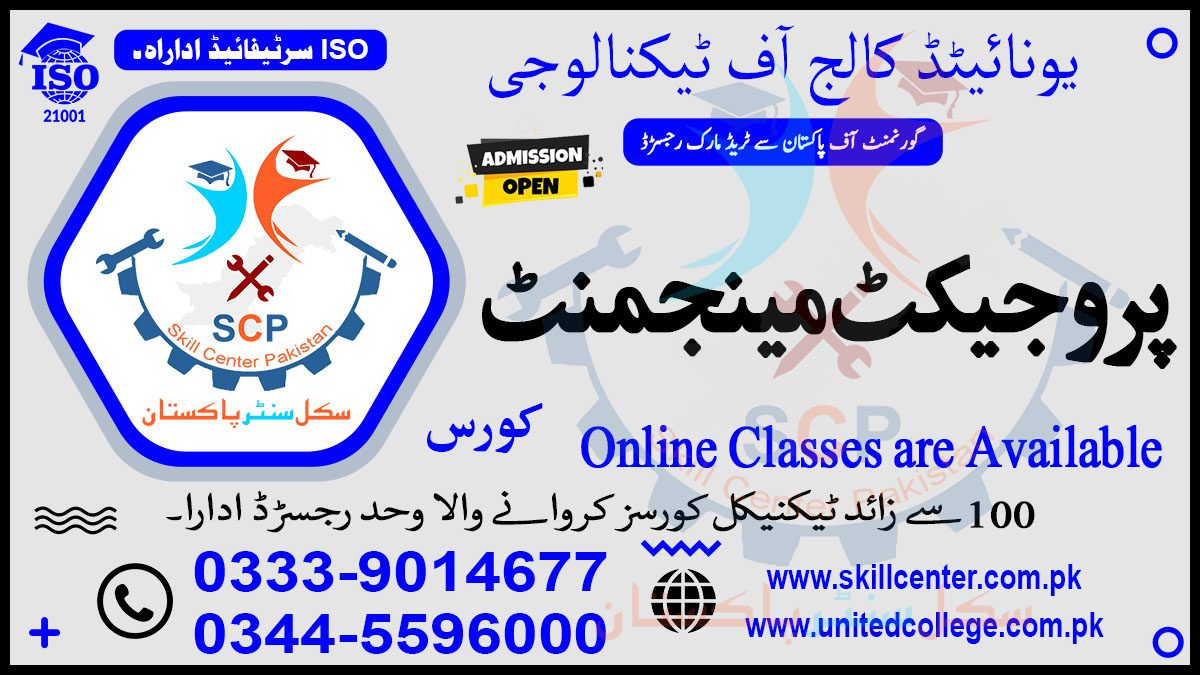Project Management Course in Rawalpindi Islamabad 0333-9014677






Introduction to Project Management
Project management is an established approach to attaining precise desires and goals within a defined timeline and finances. It entails utilizing know-how, competencies, equipment, and strategies to plot, execute, screen, and near initiatives efficiently. Whether constructing, launching a brand new product, or organizing an event, task management guarantees that duties are finished efficaciously and assets are applied optimally.
At its center, task control revolves around 5 key phases: initiation, making plans, execution, monitoring and control, and closure. Each segment performs an essential role in making sure of the venture’s success. For instance, at some point in the planning section, venture managers outline goals, create schedules, allocate resources, and perceive ability dangers. During execution, teams work collectively to finish duties, at the same time as tracking ensures that the project remains on the right track and any problems are addressed directly.
The significance of undertaking control lies in its capability to convey readability, shape, and duty to complex responsibilities. It helps businesses supply tasks on time, within price range, and to the preferred nice standards. Moreover, it fosters effective communication, collaboration, and problem-solving among team participants.
Course Overview
This course covers important areas of project management, including:
- Project Planning: Learn how to create schedules, budgets, and work breakdown structures.
- Risk Management: Understand how to identify and manage project risks.
- Quality Control: Ensure your project meets quality standards.
- Team Management: Build leadership and communication skills for working well with teams.
In the Project Management Course in Rawalpindi offered using Skill Center Pakistan, contributors are added to these essential concepts. The direction gives a stable basis for know-how in the concepts of undertaking management, getting ready freshmen to address real-international demanding situations and improve their careers in this dynamic area. Whether you’re new to mission management or looking to refresh your expertise, this creation serves as the first step toward learning the subject.
Key Topics Covered
- Introduction to Project Management
- Project Initiation and Scope
- Project Execution and Communication
- Monitoring and Controlling Projects
- Project Closure and Evaluation
- Agile Project Management Techniques
Join Skill Center Pakistan for a Project Management Course in Rawalpindi Islamabad, where you’ll learn how to manage projects effectively from start to finish. Welcome to the best project management course in Rawalpindi! Start your journey to success in the IT field with us, recognized as the top computer institute in Rawalpindi, Pakistan.
Course Details
- Duration: 3 Months
- Total Fee: 45,000 PKR


















Project Lifecycle and Phases
The mission lifecycle is a vital concept in task management, providing a based totally framework to guide a project from its inception to its finishing touch. It is split into several top-notch levels, every with unique desires, responsibilities, and deliverables. These degrees make certain that responsibilities are managed systematically, risks are minimized, and desires are finished successfully. Below is an in-depth explanation of the undertaking lifecycle and its key ranges:
Initiation Phase
The initiation segment marks the beginning of the venture. During this degree, the assignment’s purpose, goals, and scope are described. Key sports activities activities encompass figuring out stakeholders, carrying out feasibility studies, and assessing the mission’s viability. An assignment charter is developed to officially authorize the task, outlining its goals, charge variety, timeline, and key stakeholders. This phase units the muse for all next sports and guarantees alignment with organizational dreams.
Planning Phase
The planning phase is critical to the achievement of any venture. Here, an in-depth venture plan is created, outlining the responsibilities, belongings, timelines, and budget required to achieve the project’s dreams. This segment additionally consists of chance control-making plans, wherein capability risks are recognized, and mitigation strategies are superior. Additionally, communique plans, extremely good necessities, and procurement strategies are installed. Tools like Gantt charts, painting breakdown structures (WBS), and challenge manipulation software are often used to put together and visualize the plan. A well-hooked-up plan serves as a roadmap, guiding the group at some point in the mission.
Execution Phase
The execution section is where the venture plan is placed into motion. Resources are allotted, organizations are mobilized, and duties are performed steadily with the plan. This phase requires strong leadership, effective verbal exchange, and collaboration among crew individuals and stakeholders. Project managers play an essential function in ensuring that duties are completed on time and interior fee variety. Regular updates and development opinions are shared to preserve certainly all and sundry informed and aligned with the undertaking’s desires.
Monitoring and Controlling Phase
Running concurrently with the execution segment, the monitoring,g, and controlling segment focuses on monitoring development, measuring general basic performance, and making sure that the challenge remains on the route. Key usual performance symptoms (KPIs) are used to assess whether or not the task is assembly its goals. Any deviations from the plan are recognized, and corrective moves are taken to address troubles right away. This section furthermore entails dealing with modifications to the venture scope, agenda, or budget, making sure that the challenge adapts to new requirements at the same time as retaining its popular targets.
Closure Phase
The closure phase marks the giving up of the task. During this degree, the very last deliverables are passed over to the patron or stakeholders, and all task documentation is finished. A put-up-project assessment or “schooling discovered” consultation is performed to assess the assignment’s successes, disturbing situations, and regions for development. This section ensures that the undertaking is formally closed, all contractual obligations are fulfilled, and any final property is launched. The insights received from this section are treasured for enhancing future responsibilities and enhancing organizational strategies.
Importance of the Project Lifecycle
Understanding and effectively coping with the undertaking lifecycle is essential for handing over achievement projects Each segment plays an important function in making sure that duties are completed on time, inner budget, and to the famous fine requirements. By following this structured method, challenge managers can restrict dangers, optimize property, and acquire their desires successfully. Whether coping with small-scale tasks or big, complicated tasks, analyzing the venture lifecycle is a key skill for any project management expert.


























































Project Management Methodologies
Project management methodologies are set-up frameworks or strategies used to plot, execute, display, and complete obligations effectively. These methodologies offer a scientific way to control duties, property, timelines, and dangers, making sure that obligations are introduced on time, inner budget, and to the famous terrific requirements. Different methodologies are outstanding to exquisite kinds of obligations, industries, and organization dynamics. Below is an in-depth check of a number of the most appreciably used assignment manipulation methodologies:
Waterfall Methodology
The Waterfall method is one of the oldest and most traditional strategies for venture manipulation. It follows a linear, sequential way in which every segment of the undertaking must be completed in advance rather than shifting right away to the subsequent. The normal levels embody requirements accumulating, format, implementation, attempting out, deployment, and preservation. This approach is tremendously applicable for tasks with properly defined requirements and minimal predicted modifications, together with advent or production obligations. However, its inflexible form needs to make it hard to cope with changes as speedy because of the reality the project is underway.
Agile Methodology
Agile is a versatile and iterative technique that specializes in handing over small, incremental enhancements in the desire to a completely last product at the save you of the venture. It emphasizes collaboration, customer comments, and flexibility, making it high-quality for duties wherein necessities are possibly to evolve, which embody software software software software development. Agile breaks the project into smaller segments referred to as “iterations” or “sprints,” permitting businesses to continuously refine and beautify the product. This approach encourages teamwork, transparency, and fast response to exchange.
Scrum
Scrum is a subset of Agile and is one of the most famous frameworks for handling complicated obligations. It divides the project into brief cycles called “sprints,” normally lasting 2-four weeks. At the save you of every dash, the institution ensures a probable shippable product increment. Scrum is based totally on described roles (e.g., Scrum Master, Product Owner, Development Team) and everyday conferences (e.g., each day stand-ups, dash-making plans, and retrospectives) to make sure non-prevent development and development. It is notably completed in software application software utility software program development but can be completed in particular industries as well.
Kanban
Kanban is a seen undertaking manipulation method that specializes in workflow optimization and ordinary overall performance. It makes use of a Kanban board to visualize obligations, usually divided into columns collectively with “To Do,” “In Progress,” and “Done.” Teams pull duties from the backlog as functionality lets in, ensuring an everyday workflow and minimizing bottlenecks. Kanban emphasizes limiting artwork in improvement (WIP) to beautify attention and productiveness. It is especially useful for companies that address ongoing obligations or obligations with several priorities, together with help agencies or content material cloth fabric cloth introduction.
PRINCE2 (Projects IN Controlled Environments)
PRINCE2 is a manner-pushed technique considerably carried out by authorities and private sectors, specifically in the UK and Europe. It divides responsibilities into possible levels, with a robust emphasis on corporation organization business organization commercial enterprise agency, control, and danger control. PRINCE2 offers an extensive framework with defined roles, obligations, and strategies, making sure that responsibilities are well-based clearly and aligned with industrial business enterprise corporation goals. It is suitable for massive, complicated duties in which strict governance and documentation are required.
Lean Methodology
Lean challenge management specializes in maximizing rate through the manner of removing waste and optimizing assets. Originating from the Toyota Production System, Lean necessities cause to supply greater loads tons much less with the beneficial useful resource of streamlining strategies, reducing useless steps, and enhancing standard ordinary popular overall performance. It emphasizes non-save-you improvement (Kaizen) and purchaser charges. Lean is commonly completed in manufacturing and production however has moreover been tailored for awesome industries, which include software utility software improvement, technology, and healthcare.
Six Sigma
Six Sigma is a facts-pushed method aimed within the path of enhancinsatisfactionry by figuring out and eliminating defects in strategies. It uses statistical devices and strategies to investigate information, lessen variability, and accumulate near-wonderful outcomes. The DMAIC (Define, Measure, Analyze, Improve, Control) framework is normally used to region into effect Six Sigma projects. It is regularly mixed with Lean thoughts in a hybrid method called Lean Six Sigma, which makes the specialty of every performance incredible. Six Sigma is extensively achieved in manufacturing, healthcare, and finance.
Hybrid Methodology
Hybrid methodologies integrate factors of various strategies to create a custom designed framework that suits the best goals of a undertaking. For instance, a team can also possibly use Waterfall for the preliminary making plans and format tiers but transfer to Agile for execution and transport. Hybrid techniques have grow to be more and more famous as they offer the energy of Agile with the shape of traditional methodologies.
Choosing the Right Methodology
The desire for a project control approach is based totally in reality absolutely upon different factors, which include the undertaking’s scope, complexity, organization, group duration, and stakeholder requirements. For instance, Agile and Scrum are tremendous for dynamic, rapid-paced environments, on the same time as Waterfall and PRINCE2 are better for responsibilities with normal requirements and strict timelines. Understanding the strengths and obstacles of every method is vital for deciding on the right technique and ensuring mission success.
In prevent, task control methodologies offer the system and frameworks needed to control obligations correctly. By selecting the extremely good technique and adapting it to the venture’s precise desires, companies can enhance overall performance, lessen risks, and deliver a fulfillment effects.






































































































Project Planning and Scheduling
The Project Planning and Scheduling module is a vital a part of the Project Management Course provided by means of the use of Skill Center Pakistan in Rawalpindi and Islamabad. This module is designed to provide people with the know-how and equipment essential to create effective assignment plans and manage timelines effectively.
Key Learning Areas
- Project Scope Definition: Learn the way to define task goals, deliverables, and barriers to make certain a centered and possible plan.
- Work Breakdown Structure (WBS): Understand how to break down complicated initiatives into smaller, attainable obligations for higher enterprise and execution.
- Scheduling Techniques: Master the usage of Gantt charts, critical direction evaluation, and milestone tracking to create practical and actionable venture timelines.
- Resource Allocation: Gain insights into correctly assigning resources, which include personnel, finances, and materials, to ensure smooth assignment execution.
- Tools and Software: Get palms-on enjoy with industry-state-of-the-art system like Microsoft Project and Primavera for advanced venture planning and scheduling.
Benefits of the Module
- Develop the capability to assume functionality delays and position into effect mitigation strategies.
- Learn to balance assignment constraints together with time, cost, and scope.
- Enhance your talents in developing specific, actionable plans that align with organizational desires.
By the cease of this module, individuals might be equipped to create sturdy assignment plans, control schedules effectively, and ensure properly timed task delivery, making them precious assets in any professional putting.






























Risk Management in Projects
Risk management is a fundamental factor of project management that guarantees initiatives are introduced correctly, on time, and inside the rate range. In the Project Management Course in Rawalpindi provided via Skill Center Pakistan, participants benefit from in-intensity expertise and practical abilities to correctly manipulate risks for the duration of the task lifecycle.
Understanding Risk Management
Risk management includes figuring out potential dangers that could threaten a project’s fulfillment, studying their impact, and imposing strategies to mitigate or do away with them. This proactive technique lets project managers count on challenges and put together solutions in advance rather than trouble with upward push-ups.
Key Components of Risk Management
The path covers critical factors of danger manipulation, which include:
- Risk Identification: Techniques to systematically pick out capability dangers, which include brainstorming, checklists, and expert interviews.
- Risk Analysis: Assessing the opportunity and impact of diagnosed dangers using qualitative and quantitative techniques.
- Risk Prioritization: Ranking risks primarily based on their severity to attention resources on the most crucial threats.
- Risk Mitigation Strategies: Developing movement plans to lessen the possibility or effect of risks, which consist of avoidance, switch, mitigation, and popularity.
- Monitoring and Control: Continuously monitoring risks sooner or later of the challenge and adjusting techniques as desired.
Tools and Techniques
Participants are delivered to enterprise-widespread equipment like risk registers, SWOT analysis, Monte Carlo simulations, and contingency planning. These tools help in developing a hooked up framework for coping with risks efficiently.
Benefits of Effective Risk Management
By getting to know hazard control, challenge managers can:
- Minimize unexpected disruptions and delays.
- Improve preference-making and useful resource allocation.
- Enhance stakeholder self warranty and acquire as genuine with.
- Increase the possibility of project mission targets.
Skill Center Pakistan’s direction guarantees that individuals depart with self-belief and recognize the ways to address risks in any challenge, making them treasured belongings in their professional roles. Whether you are coping with small-scale responsibilities or big, complex responsibilities, chance management talents are vital for making sure of prolonged-time period success.



















































Budgeting and Cost Management
One of the maximum crucial components of the Project Management Course in Rawalpindi supplied via Skill Center Pakistan is the point of interest on Budgeting and Cost Management. This module is designed to offer members the talents and expertise vital to efficiently plan, screen, and manipulate undertaking finances, making sure a hit undertaking transport is within allotted budgets.
Key Learning Objectives
- Budget Creation: Learn a way to broaden accurate and sensible budgets by information undertaking scope, resource requirements, and value estimation techniques.
- Cost Estimation and Forecasting: Master methods for predicting challenge charges, including backside-up and top-down estimation techniques, to ensure economic preparedness.
- Expense Tracking and Control: Gain understanding in monitoring project expenses, identifying variances, and implementing corrective actions to live within finances.
- Resource Allocation: Understand a way to allocate assets correctly to maximize productiveness whilst minimizing pointless expenses.
- Risk Management: Learn to pick out economic risks and increase techniques to mitigate them, making sure initiatives stay financially viable.
Practical Application
The direction contains actual international case studies, interactive sporting activities, and palms-on education with enterprise-widespread equipment like Microsoft Project and Primavera. These realistic elements permit members to use budgeting and cost control ideas in simulated mission environments, preparing them for real-life challenges.
Why It Matters?
Effective budgeting and value management are crucial for the fulfillment of any assignment. By gaining knowledge of those competencies, contributors can be able to supply projects on time and inside budget, improving their credibility and fee as undertaking managers. This module guarantees that specialists are ready to handle the economic complexities of challenge control with self belief and precision, making them quintessential belongings to their corporations.
Skill Center Pakistan’s complete method to Budgeting and Cost Management guarantees that participants depart the course with the knowledge needed to excel in dealing with assignment budget, contributing to their general profession increase and achievement.













































Stakeholder Management
One of the most important elements of the Project Management Course in Rawalpindi provided with the aid of way of Skill Center Pakistan is the Stakeholder Management module. This segment is designed to equip members with the skills to efficaciously perceive, interact, and manage stakeholders at some unspecified time in the future of the task lifecycle. Stakeholders play an essential role in the success of any mission, and knowledge of their goals, expectations, and affect is essential to achieving challenging goals.
Key Components of Stakeholder Management
- Stakeholder Identification: Participants discover ways to apprehend all relevant stakeholders, consisting of inner and external events, and categorize them based mostly on their roles and pastimes inside the undertaking.
- Stakeholder Analysis: The route teaches techniques to analyze stakeholders’ tiers of having an effect on, hobby, and capacity effect at the project. Tools like stakeholder mapping and electricity-interest grids are introduced to prioritize engagement efforts.
- Engagement Strategies: Attendees gain insights into growing tailor-made verbal exchange plans to interact stakeholders efficiently. This includes statistics the way to cope with problems, manage expectations, and assemble believe.
- Conflict Resolution: The module moreover covers strategies to cope with conflicts and disagreements among stakeholders, ensuring clean undertaking improvement.
- Relationship Building: Participants learn how to foster high extremely good relationships with stakeholders to strong their guide and collaboration, it is important for venture fulfillment.
Why Stakeholder Management Matters?
Effective stakeholder manipulation guarantees that every party involved is aligned with the mission’s objectives, decreasing risks and enhancing collaboration. By mastering those capabilities, people can navigate complicated stakeholder dynamics, mitigate potential demanding conditions, and supply obligations that meet or exceed expectations.
Skill Center Pakistan’s emphasis on sensible, actual international programs guarantees that individuals depart the course with actionable strategies to manipulate stakeholders efficiently, making it a useful addition to their task control toolkit.













































Project Documentation and Reporting
The Project Management Course in Rawalpindi, furnished with the resources of Skill Center Pakistan, includes an in-depth module on Project Documentation and Reporting, which is vital for ensuring the achievement and transparency of any undertaking. This module is designed to equip members with the capabilities needed to create, control, and present complete venture documentation and critiques that align with industry excellent practices.
Importance of Project Documentation
Project documentation serves as the backbone of any task, presenting an easy report of plans, strategies, and improvements. In this path, participants will learn how to increase key documents which include project charters, scope statements, work breakdown structures (WBS), threat control plans, and communique plans. These files make sure that each team’s individual and stakeholders are aligned, reducing the chance of misunderstandings and venture delays.
Effective Reporting Techniques
Reporting is a critical detail of mission manipulation because it keeps stakeholders informed about the task’s repute, demanding situations, and achievements. The course covers the introduction of various varieties of evaluations, such as development evaluations, average performance evaluations, and final task closure critiques. Participants will learn how to gift complicated information in a clear, concise, and actionable manner, and the usage of seen aids like charts, graphs, and dashboards wherein important.
Tools and Templates
To streamline the documentation and reporting approach, the course introduces individuals to business enterprise-great gear and software programs, which include Microsoft Project, Excel, and Primavera. Additionally, contributors will gain proper entry to customizable templates for growing professional documents and reviews, saving time and ensuring consistency throughout tasks.
Practical Application
Through palms-on physical games, case research, and actual-global scenarios, contributors will practice growing and dealing with undertaking documentation and opinions. This practical approach ensures that they’re able to apply their reading straight away to their place of business, improving overall performance and mission outcomes.
By the quit of this module, contributors may have an intensive knowledge of a manner to maintain accurate facts, communicate successfully with stakeholders, and use documentation and reporting as gadget for a achievement mission delivery. This expertise is beneficial for all of us looking for to excel in task manipulate roles and make a contribution to the success of their business enterprise.









































Tools and Software for Project Management
The Project Management Course in Rawalpindi presented via Skill Center Pakistan gives participants in-depth training in the most extensively used tools and software programs in the assignment control industry. These gear are crucial for planning, executing, monitoring, and final initiatives successfully. Below is a detailed assessment of the important things gear and software covered inside the path:
1. Microsoft Project
Microsoft Project is a cornerstone device for project managers, allowing them to create distinctive undertaking plans, allocate sources, and music progress. Participants will learn how to use this software program to expand Gantt charts, set milestones, and manage timelines successfully.
2. Primavera
Primavera, advanced through Oracle, is a robust challenge management software extensively used in industries like construction, engineering, and production. The course covers its superior capabilities, including aid allocation, threat management, and managing huge-scale, complicated tasks.
3. Trello
Trello is a person-pleasant, visible collaboration device that enables teams to prepare obligations and workflows through the use of forums, lists, and playing cards. Participants will learn how to use Trello for mission control, team coordination, and progress tracking in agile environments.
4. Asana
Asana is another popular undertaking management tool designed to streamline challenge assignments, cut-off dates, and crew verbal exchanges The course teaches individuals how to create initiatives, assign duties, and display progress through the use of Asana’s intuitive interface.
5. Smartsheet
Smartsheet combines the functionality of spreadsheets with undertaking management features, making it ideal for planning, tracking, and reporting. Participants will discover its skills for resource control, budgeting, and automated workflows.
6. QuickBooks
For economic control, the path introduces QuickBooks, a device that enables assignment managers to write prices, create budgets, and generate financial reviews. This is especially useful for making sure initiatives live within the price range.
7. Collaboration and Communication Tools
The route also covers gear like Slack and Microsoft Teams, which are crucial for seamless communication and collaboration amongst crew contributors, especially in far-flung or hybrid work environments.
By gaining palms-on experience with those equipment, contributors may be equipped to deal with actual-global mission management challenges, improve performance, and deliver successful effects. Skill Center Pakistan ensures that newcomers not simplest understand the theoretical components of undertaking management but additionally master the sensible skills needed to excel in their careers.
































































Leadership and Team Management
The Leadership and Team Management module is a central factor of the Project Management Course supplied via Skill Center Pakistan. This module is designed to equip individuals with the capabilities important to steer teams correctly and ensure the successful execution of projects.
Key Focus Areas
- Inspiring and Motivating Teams: Learn the manner to inspire crew contributors, improve morale, and maintain excessive stages of motivation in the path of the assignment lifecycle.
- Effective Communication: Develop easy and concise verbal exchange techniques to ensure seamless collaboration and avoid misunderstandings.
- Conflict Resolution: Gain techniques to discover, deal with, and clear up conflicts internal organizations in a positive and expert manner.
- Emotional Intelligence: Understand the position of emotional intelligence in management, in conjunction with self-popularity, empathy, and relationship manipulation.
- Decision-Making and Delegation: Master the art of creating knowledgeable choices and delegating responsibilities efficiently to maximize group productivity.
Practical Learning Approach
The module includes actual-global case research, interactive organization sports, and role-playing wearing activities to offer hands-on revel in in coping with businesses. Participants may even explore strategies for dealing with numerous personalities, fostering inclusivity, and developing a powerful painting way of existence that encourages innovation and collaboration.
Outcome
By the cease of this module, individuals should have the self assurance and abilities to influence organizations efficiently, navigate annoying situations, and strength duties to a hit finishing touch. This education ensures that aspiring challenge managers aren’t simplest technically gifted however also able to coping with the human dynamics which might be important to task success.




































Quality Management in Projects
Quality Management is an essential pillar of successful project execution, ensuring that each deliverable meets predefined requirements and aligns with stakeholder expectancies. It carries a structured technique for maintaining consistency, reliability, and excellence in the course of the undertaking lifecycle. Below is an intensive breakdown of its key additives and importance:
1. Quality Planning
Quality Planning is the first step in Quality Management, in which assignment groups outline the wonderful standards, requirements, and metrics that deliverables need to meet. This section includes identifying stakeholder requirements, placing clean targets, and organising strategies to accumulate favored results. Tools like outstanding checklists, benchmarking, and flowcharts are regularly used to create a robust splendid plan.
2. Quality Assurance (QA)
Quality Assurance makes a speciality of preventing defects thru improving tactics and ensuring adherence to quality standards. It consists of everyday audits, way evaluations, and the implementation of nice practices to hold consistency. QA emphasizes proactive measures, together with education organization contributors and refining workflows, to restriction errors earlier than they occur.
3. Quality Control (QC)
Quality Control is the method of examining and testing deliverables to understand and correct defects. Unlike QAwhichis is preventive, QC is corrective and includes activities like peer evaluations, checking out, and inspections. Tools at the sias manipulating charts, Pareto assessment, and statistical sampling are commonly used to display and keep nice requirements.
4. Importance of Quality Management in Projects
Effective Quality Management guarantees that tasks deliver cost at the same time as minimizing risks and prices. It enhances purchaser delight with the aid of assembly or exceeding expectations and fosters a lifestyle of non-forestall development inside groups. By integrating Quality Management, groups can reap lengthy-term achievement, assemble credibility, and maintain an aggressive part of their organization.
5. Tools and Methodologies
Several tools and methodologies guide Quality Management in responsibilities, together with:
- Six Sigma: An information-pushed approach to reducing defects and enhancing processes.
- Total Quality Management (TQM): A holistic technique centered on non-stop development and client satisfaction.
- ISO Standards: Internationally recognized frameworks for excellent guarantee and manipulation systems.
In end, Quality Management is integral for undertaking success. By prioritizing incredible at each level, businesses can deliver superior effects, build receive as authentic with with stakeholders, and achieve sustainable boom.




























































Career Opportunities and Certifications
Career Opportunities
The Project Management Course in Rawalpindi supplied using Skill Center Pakistan is designed to unlock an international of thrilling career opportunities for its individuals. Upon completing the path, graduates are prepared with the competencies and knowledge had to excel in various roles throughout more than one industry. Some of the key positions they can pursue consist of Project Manager, Project Coordinator, Operations Manager, Business Analyst, Team Leader, and Scrum Master. These roles are exceptionally popular in sectors including creation, statistics generation, healthcare, finance, production, telecommunications, and even authority tasks.
The direction specializes in practical abilities like task-making plans, threat management, budgeting, aid allocation, and team management, making sure that participants are nicely organized to handle real-global demanding situations. Whether it’s managing big-scale infrastructure projects, main software improvement teams, or overseeing enterprise operations, the education supplied by using Skill Center Pakistan empowers people to deliver initiatives on time, inside budget, and to the very best standards. This makes graduates of the route noticeably valuable to employers, starting doorways to rewarding and high-paying professional paths.
Certifications
One of the standout capabilities of the Project Management Course in Rawalpindi is the globally recognized certification presented upon successful finishing touch. This certification serves as a testomony to the player’s know-how and commitment to professional improvement. It is in particular valuable for people looking to decorate their resumes, stand out within the aggressive task market, or develop of their present day careers.
The certification is widely commonplace through employers throughout industries and is specially beneficial for the ones aiming to paintings in multinational businesses or pursue worldwide task opportunities. It demonstrates a robust understanding of challenge control standards, gear, and fine practices, making licensed professionals noticeably ideal to corporations. Additionally, the certification can be a stepping stone for similarly expert growth, including pursuing superior project management credentials like PMP (Project Management Professional) or PRINCE2.
With the growing call for skilled mission managers global, this certification no longer simplest boosts employability but additionally paves the way for lengthy-term career fulfillment and management roles. By finishing this route, members advantage a competitive facet, ensuring they may be properly-located to thrive in the dynamic and ever-evolving subject of mission management.
After completing this course, you can start a career as a project manager in various fields like IT, healthcare, and construction. Get a strong foundation for a successful career in project management today!























































Frequently Asked Questions (FAQ's)
1. What is the length of the Project Management Course?
The length of the path varies depending on the software degree. Typically, it stages from 4 to eight weeks, with bendy schedules to cope with operating professionals.
2. Who can be part of this route?
The route is open to college students, professionals, and entrepreneurs who want to examine challenge control competencies. No in advance revel in is needed for novices, making it suitable for all degrees.
3. What topics are blanketed inside the direction?
The route covers crucial subjects which includes venture planning, threat management, budgeting, organization management, communication strategies, and device like Microsoft Project and Primavera.
4. Is the path certified?
Yes, upon a successful finishing touch, individuals acquire a diagnosed certification from Skill Center Pakistan, which is valued in the manner market.
5. Are there any stipulations for enrollment?
No specific situations are required. However, essential pc literacy and eager interest in undertaking management are endorsed.
6. What coaching techniques are used within the route?
The route combines theoretical understanding with realistic software, consisting of case research, business enterprise discussions, and hands-on physical games the use of organization-desired equipment.
7. Can I take the direction online?
Yes, Skill Center Pakistan gives every in-character and on line classes to cater to the dreams of close by and far flung individuals.
8. What career possibilities can this course provide?
Graduates can pursue roles consisting of Project Manager, Team Leader, Project Coordinator, or Consultant in diverse industries, collectively with creation, IT, healthcare, and extra.
9. How do I enroll within the path?
You can join by means of way of visiting the Skill Center Pakistan website or contacting their workplace in Rawalpindi/Islamabad. Registration information and charge alternatives are supplied on their platform.
10. Is financial assistance or installment charge to be had?
Skill Center Pakistan offers bendy rate plans for eligible candidates. Contact their guide institution for more information on financial help options.
For additional inquiries, experience free to reach out to Skill Center Pakistan right now!































































































































































































